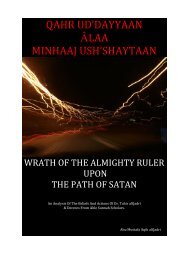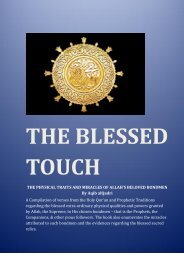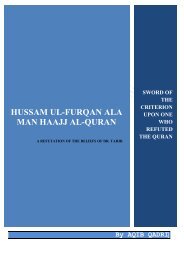The Book Of Prayer (Kitaab-ul-Salaat)
The Book Of Prayer (Kitaab-ul-Salaat)
The Book Of Prayer (Kitaab-ul-Salaat)
You also want an ePaper? Increase the reach of your titles
YUMPU automatically turns print PDFs into web optimized ePapers that Google loves.
I bear witness that there is no God except Allah, I bear witness that there is no<br />
God except Allah:<br />
I bear witness that Mohammed is the Messenger of Allah, I bear witness that<br />
Mohammed is the Messenger of Allah:<br />
Come towards <strong>Prayer</strong>, come towards <strong>Prayer</strong>; Come towards Success, come<br />
towards Success;<br />
Allah is the Greatest, Allah is the Greatest; <strong>The</strong>re is no God except Allah!<br />
While saying “ Hayya alas-Salaah Hayya alal-Falaah” in the “ Azaan” or in the “ Iqamah” ,<br />
one must face right and left respectively. Upon hearing the “ Azaan” , it is commanded to reply<br />
to it - i.e. to repeat the words which the Caller (Muazzin) is saying, except for the words “ Hayya<br />
alas-Salaah Hayya alal-Falaah” , for which one must say "Laa hawla wa laa quwwata illaa<br />
Billah" (<strong>The</strong>re is neither power nor strength, except with Allah).<br />
In the “ Azaan” for the Dawn <strong>Prayer</strong>, the Caller must say the following words twice after<br />
“ Hayya alas-Salaah Hayya alal-Falaah” - "As<strong>Salaat</strong>u Khairum-minun-Naum" (<strong>Prayer</strong> is better<br />
than sleep). <strong>The</strong> response to these words is "Sadaqta wa bararta, wa bilHaqqi Nataqta" (You<br />
have confirmed the truth and you did well - and you have spoken a fact.)<br />
While the “ Azaan” is being said, one must not ind<strong>ul</strong>ge in any talk, recite Qur'an etc., nor<br />
ind<strong>ul</strong>ge in other activities. Listen to the “ Azaan” attentively and reply to it. <strong>The</strong> same applies to<br />
the “ Iqamah” . For the one who stays engrossed in talk while the “ Azaan” is being<br />
proclaimed, there is a danger of him dying an evil death. (We seek Allah's refuge)<br />
When the Caller proclaims "Ash-hadu anna Muhammadar-Rasool<strong>ul</strong>lah", one must respond by<br />
sending peace and blessings upon the Holy Prophet - "SallAllahu alayka yaa Rasool Allah"<br />
(Allah's blessings be upon you, O the Messenger of Allah). It is recommended (Mustahab) to<br />
kiss one's thumbnails and touch them on one's eyes while saying, "Qurratu ayni beka yaa<br />
Rasool-Allah - Allahumma Matteyni Bis-Samye wal-Basar" (<strong>The</strong> coolness of my eyes is due to<br />
you, O the Messenger of Allah! O Allah, grant me the usage of the ears and the eyes). <strong>The</strong> one<br />
who does this will be taken by the Holy Prophet (peace and blessings be upon him) to Paradise.<br />
<strong>The</strong> words proclaimed to announce the beginning of the congregational <strong>Prayer</strong>s (with Jamaat),<br />
are called “ Iqamah” . All words are the same as in the “ Azaan” , except that after the second<br />
"Hayya alal-Falaah", the following words are said twice - "Qad QamatisSalaah" (<strong>The</strong> <strong>Prayer</strong><br />
has been established). In response to this, one sho<strong>ul</strong>d say "AqamahAllah wa adamaha maa<br />
damatiSamawate walArd" (May Allah keep it established, and grant it permanence as long as the<br />
skies and the earth remain.)<br />
It is undesirable (Makrooh) for a person who comes in at the time of “ Iqamah” to remain<br />
standing and wait - he sho<strong>ul</strong>d sit down and stand up only when the Proclaimer (Mukabbir) has<br />
announced "Hayya alal-Falaah". Likewise those who are already present in the mosque must<br />
stand up at this moment. <strong>The</strong> same applies to the “ Imaam” .





